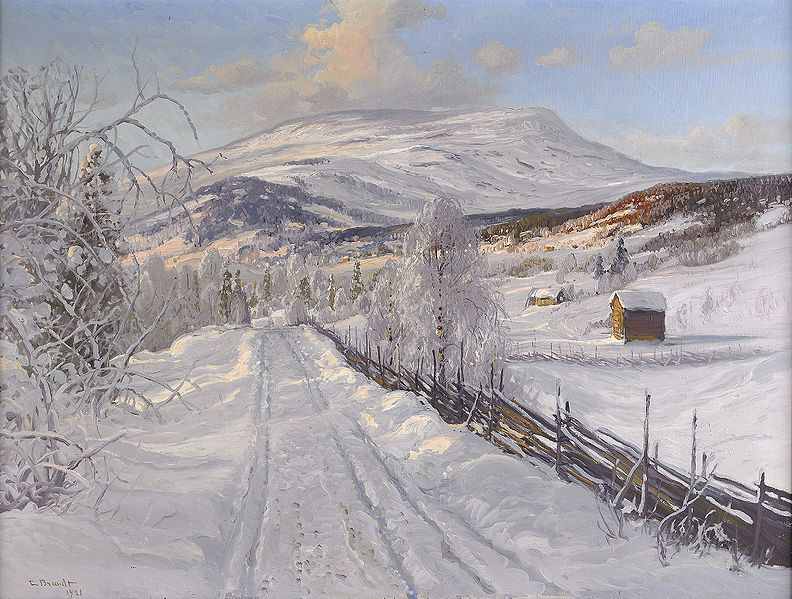 From 1793 to 1800, the region of Fougères, in Northeast France, was the scene of the epic struggle of the Chouans. The Chouans were peasants who rose up against the French Revolution in defence of the Monarchy and the Church.
From 1793 to 1800, the region of Fougères, in Northeast France, was the scene of the epic struggle of the Chouans. The Chouans were peasants who rose up against the French Revolution in defence of the Monarchy and the Church.
One winter’s night in 1795, a column of soldiers of the revolutionary Republic was making its way along a path skirting a forest. Their steps were heavy. They were bored, and they were tired from the enormous weight of the rucksacks and muskets they carried on their backs.
They trudged along, leading a peasant prisoner who had tried to ambush them. The peasant had fired his musket at the sergeant, but the bullet passed through the man’s hat, ricocheted off a tree, and broke a pipe that another soldier was smoking.
The furious soldiers immediately set out in hot pursuit of the fleeing sniper. Hunted down and cornered against a cliff, the peasant had been captured and disarmed.
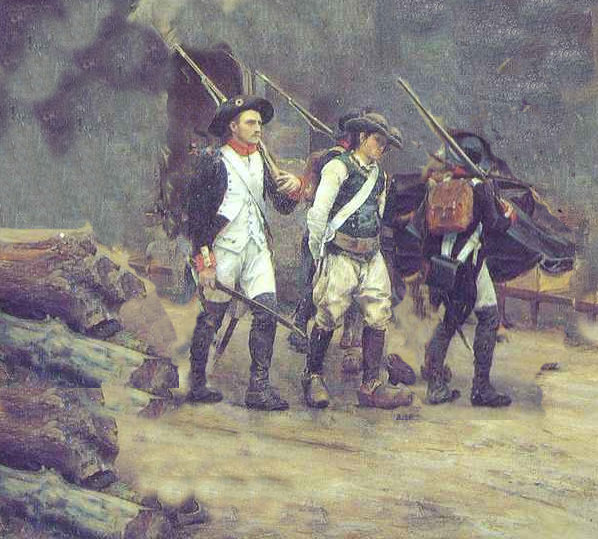 Now he was following the soldiers, hands tied, with an forlorn look. His small, clear eyes watched the hedges along the path, as well as the windy paths that ran off in either direction. Two soldiers wrapped the ends of the ropes tying his wrists around their arms.
Now he was following the soldiers, hands tied, with an forlorn look. His small, clear eyes watched the hedges along the path, as well as the windy paths that ran off in either direction. Two soldiers wrapped the ends of the ropes tying his wrists around their arms.
At the crossroads of Servilliers, the sergeant called a halt. The men, worn out, stacked their weapons and threw their rucksacks on the grass. They proceeded to gather up dry branches and leaves from which they made a bonfire in the middle of the clearing.
At the same time, two of them tied the peasant to a tree with the rope that bound his wrists.
The Chouan watched everything that was going on very keenly. He did not tremble, nor did he say a word, but anguish could be seen on his features. He knew that death was at hand.
His anxiety did not go unnoticed to one of the Blues, as the soldiers of the Revolution were known. This man had been detailed to keep a close eye on the prisoner. He was a slender adolescent, with a mocking and cutting tongue. He made fun of his prisoner, saying in a sharp Parisian accent:
“Don’t be afraid, flower! You won’t die just yet; you still have six hours to live…”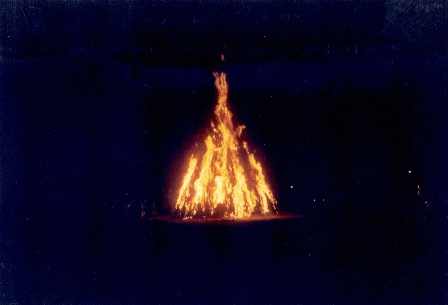
His comments were interrupted by a loud gruff voice from across the clearing.
“Tie him up well, Pete! We can’t let him fly away!”
“Don’t worry Sergeant Torquatus, we need to take him in one piece to the general!”
Then the lad went back to his mocking: “You know, you dog, don’t think you are going to be treated like those nobles. The Republic is not rich and there is a shortage of guillotines. But don’t worry, you will get your share of lead bullets: six to your head and six to your body. So that is something for you to think about until tomorrow morning. It will keep you entertained!”
The peasant stood as if not hearing, an impenetrable look settled over his face.
Having said this, Private Pete went and sat by his companions by the fire. Taking a piece of coarse bread from his rucksack, he began to eat it tranquilly. Having finished eating, Pete started to clean his musket. He chose a bullet and, holding it delicately in his hands, said to the peasant who was following his every movement:
“See this, my child? This one is for you!” And he put the bullet in the chamber
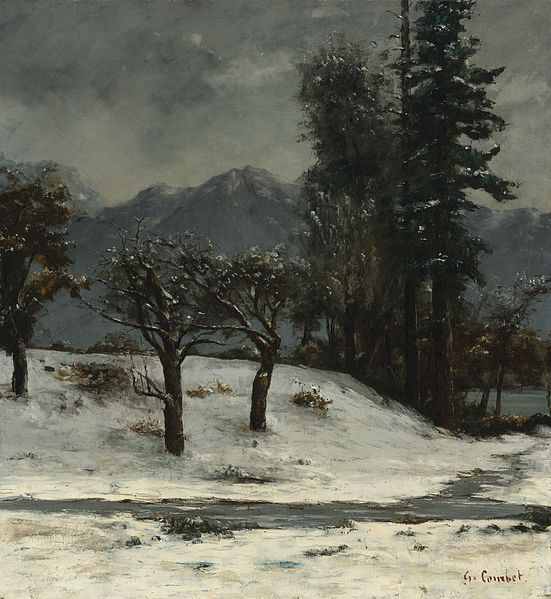 Everyone started to laugh, each trying to outdo the other in the macabre game of tormenting the unfortunate prisoner.
Everyone started to laugh, each trying to outdo the other in the macabre game of tormenting the unfortunate prisoner.
“I have an equally good dose for you!” one shouted.
“You are going to be like a sieve,” another joked.
“I will be last: one for each ear!” guffawed Sergeant Torquatus.
And then, in a sudden fit of rage, he came up to him. “Oh! You wretched Chouan, I would like to kill a thousand of you with one shot!…”
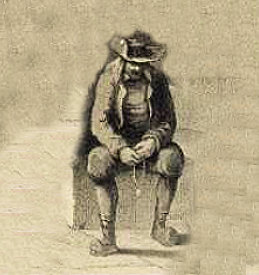 The peasant was silent and calm under this barrage of threats. He seemed to be listening to a faraway sound that the shouts and laughter of the soldiers made it difficult to hear.
The peasant was silent and calm under this barrage of threats. He seemed to be listening to a faraway sound that the shouts and laughter of the soldiers made it difficult to hear.
Suddenly he dropped his head and concentrated. From the depths of the forest one could hear the sound of a bell ringing in the night. It sounded high and clear as it came on the breeze. Then the wind shifted into the north, and immediately another bell, deeper in tone, began to sound. Soon another joined in – this time more melancholic – coming from another direction.
The Blues had fallen silent with surprise and apprehension. They too strained to hear.
“What is this?” asked the sergeant. “Why are the bells ringing?… Is this a signal?… The bandits must be sounding the alarm!”
Then they all started shouting together, some at the prisoner, some at each other. Many reached for their weapons.
The peasant raised his head, and gazing at them serenely he said: “It is Christmas.”
“It’s what?” replied the sergeant.
“Christmas. They are ringing the bells for Midnight Mass.”
The soldiers felt foolish, and began to curse, then grumble, then fall silent as they took their places once more around the fire.
[like url=https://www.facebook.com/ReturnToOrder.org]
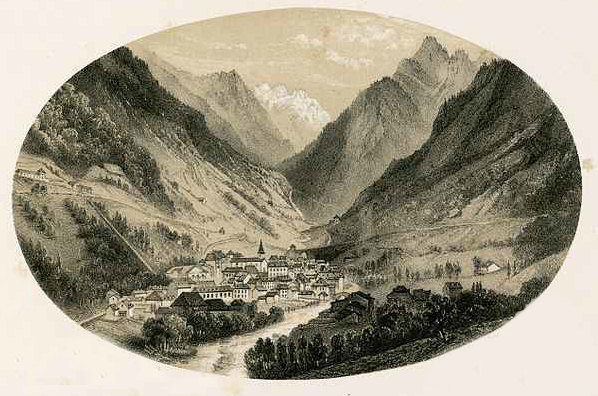 For a while no one spoke. Christmas… Midnight Mass… They had not heard these words for a long while.
For a while no one spoke. Christmas… Midnight Mass… They had not heard these words for a long while.
It stirred vague memories of happier times, of long-forgotten tenderness, of peace.
With heads hung low, they heard those bells that spoke a forgotten language. Sergeant Torquatus put his pipe down, crossed his arms and closed his eyes as one savouring a symphony. Then, ashamed at this sign of weakness, he turned to the prisoner and asked in a severe tone:
“Are you from this area?”
“I am from Coglès, not too far from here.”
The sergeant became interested. “So there are priests in your town?”
“The Blues have not taken everything; they have not crossed the Couesnon river. So on that side one still lives in freedom. Can’t you hear? It is the bell of Parigué that is ringing now. That other smaller one is from the castle of the Lord of Bois-Guy. And that one further off is the bell of Montours. If the wind were right we could even hear the big bell of Landéans.”
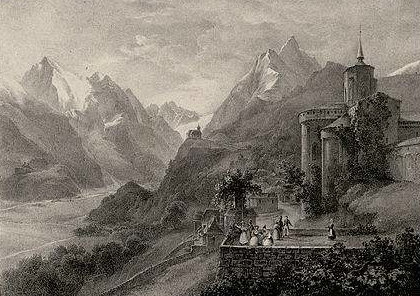 One of the soldiers called Gil had been silent while the others had been threatening the Chouan. He now listened attentively and seemed to be moved. The others, after a momentary feeling of tenderness, had already closed their hearts.
One of the soldiers called Gil had been silent while the others had been threatening the Chouan. He now listened attentively and seemed to be moved. The others, after a momentary feeling of tenderness, had already closed their hearts.
At that moment, from every point of the compass, the tolling of faraway village bells could be heard. It was a sweet melody that rose louder or softer depending on the wind.
Gil hung his head and listened. He thought of things forgotten long ago. He saw the church of his native village resplendent with lighted candles, the manger with its big stones covered in moss where little red and blue lamps shone. He heard, in his memory, the joyful Christmas hymns that had been sung for generations. They were innocent hymns, as old as France, speaking of shepherds, flutes, stars, and children; of peace, pardon, and of hope… He felt his heart melt in the good warmth of these gentle images he had for so long forgotten.
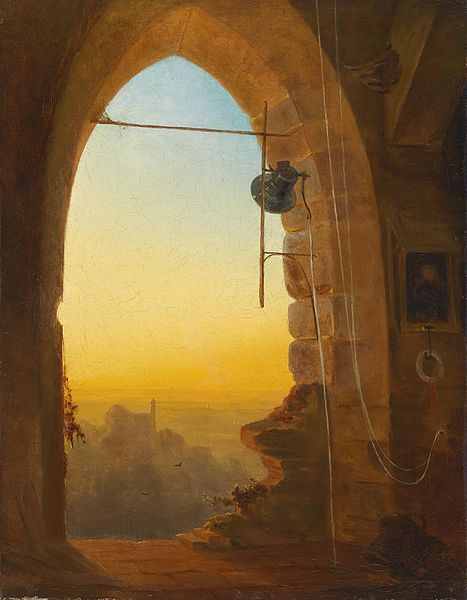 The bells continued to toll from afar. Torquatus ordered everyone to sleep and put Gil on the first watch. It took no time at all to set up an improvised camp, and the Blues, exhausted by the day’s toils and wishing to forget the sound of those bells that had brought them so many memories from their happy childhoods, snored away stretched out on their sleeping mats.
The bells continued to toll from afar. Torquatus ordered everyone to sleep and put Gil on the first watch. It took no time at all to set up an improvised camp, and the Blues, exhausted by the day’s toils and wishing to forget the sound of those bells that had brought them so many memories from their happy childhoods, snored away stretched out on their sleeping mats.
What Does Saint Thomas Say About Immigration?
The fire still crackled, but less so. Only Gil and the Chouan were awake. The Blue then went over to where the Chouan was tied up.
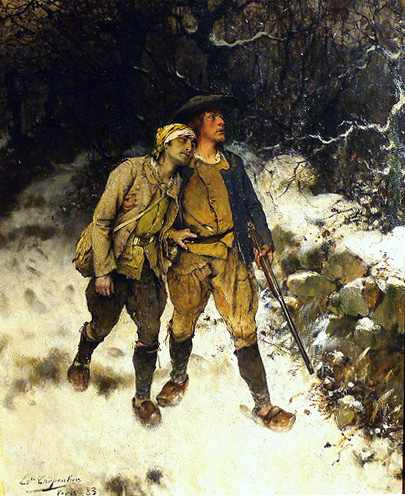 “Do you know,” the soldier said, “where I come from we used to make a huge manger in the church and we would place the Infant Jesus there surrounded by Our Lady and St. Joseph.”
“Do you know,” the soldier said, “where I come from we used to make a huge manger in the church and we would place the Infant Jesus there surrounded by Our Lady and St. Joseph.”
And then he suddenly said: “Do you want to go free?”
“What about you? They will tear you to pieces.”
“I will go with you. I am fed up with this rag of a war. Anyway, I was enlisted without a choice. My family is Catholic. At home, from my earliest days they taught me to respect the King.”
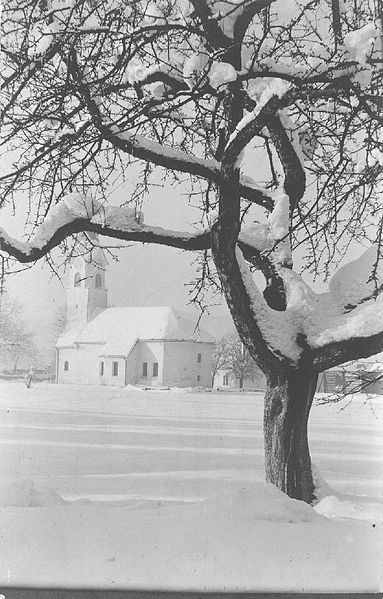 “Then come with me,” the Chouan answered. “Be faithful once again. I will take you to a priest so you can go to Confession. Together we will fight for Our Lord Jesus Christ and the king.”
“Then come with me,” the Chouan answered. “Be faithful once again. I will take you to a priest so you can go to Confession. Together we will fight for Our Lord Jesus Christ and the king.”
The Blue said no more, but took his knife from his pouch and sliced the ropes that bound the prisoner. It was not long before both had slipped away into the blackness of the night.
One could no longer hear the bells in the wind, but they continued to ring in the hearts of the two men. It was Christmas!
END


